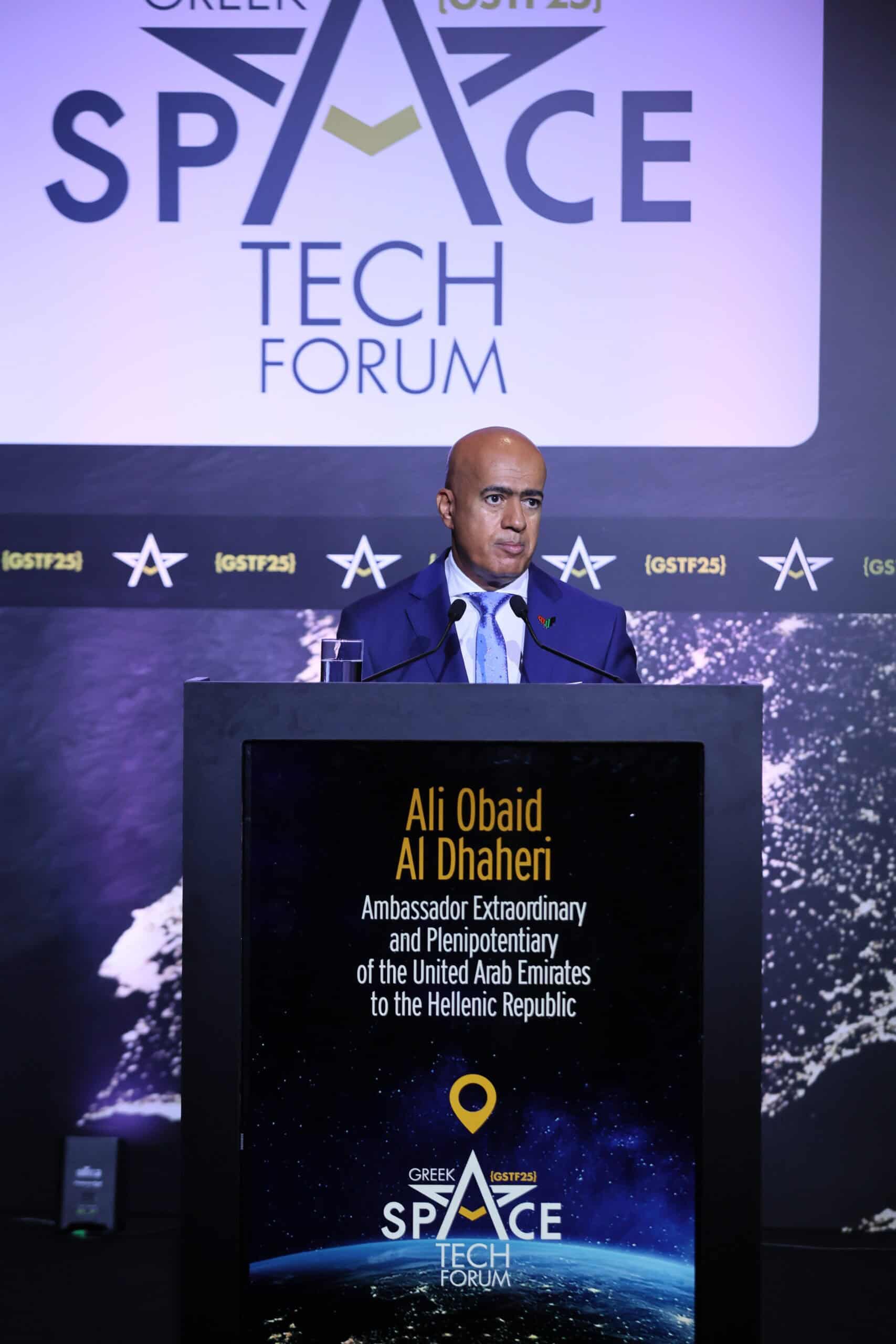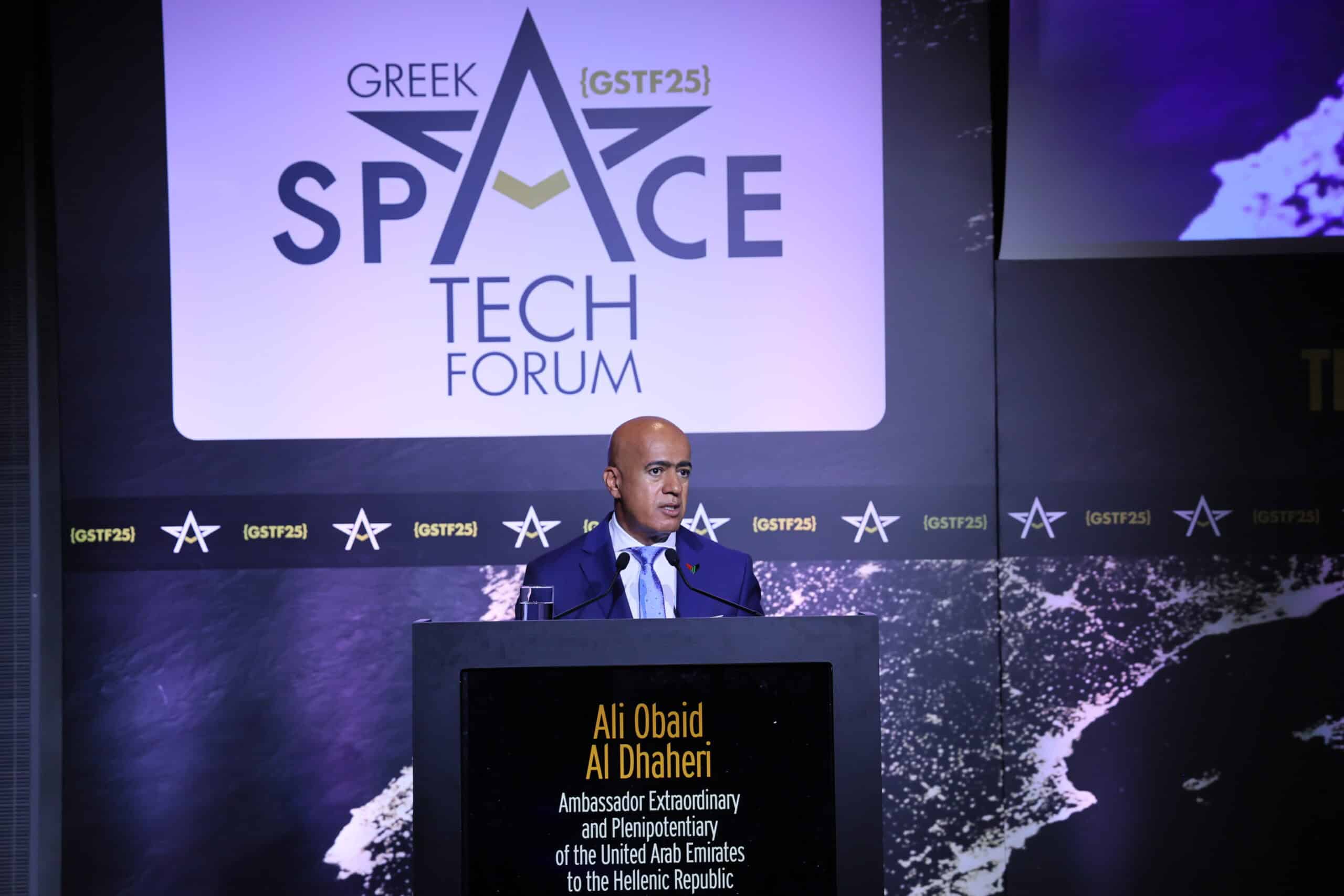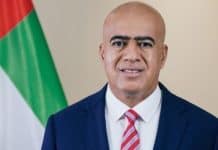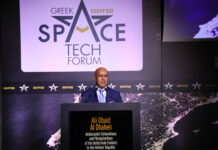An important speech was delivered during the 2nd Greek Space Tech Forum by Ali Obaid Al Dhaheri Ambassador Extraordinary and Plenipotentiary of the United Arab Emirates to the Hellenic Republic.
The speech:
It is a profound honor to address you today at this esteemed gathering dedicated to the advancement of space science, innovation, and international cooperation.
I would like to thank our gracious hosts for organizing this timely event, which underscores the global importance of space exploration as a driver of scientific discovery, sustainability, and collaboration.
Over the past two decades, the UAE has emerged as a pioneering force in the global space sector—driven by visionary leadership, strategic investments, and a commitment to innovation and international cooperation. What once seemed an ambitious aspiration has become a national reality.
The UAE’s venture into space began with a clear national vision rooted in long-term planning, technological self-reliance, and international collaboration.
Since the launch of DubaiSat-1 in 2009, we have made tremendous progress:
- More than 25 satellites have been launched by the UAE to date.
- These satellites serve diverse functions, from Earth observation to telecommunications, navigation, and scientific research.
- The UAE has invested over US$10 billion in its space sector to date, with both government and private contributions.
The UAE’s space ecosystem has evolved rapidly, driven by the strategic vision to build national capacity in advanced space technologies.
Key institutions such as the Mohammed bin Rashid Space Centre (MBRSC) and Yahsat—a top 10 global satellite communications provider—have been instrumental in establishing the country’s indigenous capabilities in satellite technology, remote sensing, and space science.
As a result, the United Arab Emirates now stands at the forefront of satellite manufacturing and Earth observation. Yahsat operates an advanced fleet of satellites providing coverage across more than 150 countries, supporting governmental, commercial, and humanitarian missions.
Τhe United Arab Emirates became the fifth nation in history to reach Mars
Today, UAE-manufactured satellites deliver services to over 80% of the global population, underscoring the nation’s growing leadership in global space-based connectivity and data services.
To catalyze further growth, the UAE Government established the National Space Fund, a US$820 million strategic initiative designed to support the private space sector, advance national competencies, and fund cutting-edge projects.
One such project, SERB, will be a constellation of radar imaging satellites offering all-weather, day-and-night Earth observation for environmental monitoring and sustainable development.
 A major milestone was the successful launch of MBZ-SAT on 14 January 2025. Developed by the Mohammed Bin Rashid Space Centre, MBZ-SAT is now one of the most advanced commercial Earth observation satellites in the region. With sub-meter resolution capabilities, it supports applications in environmental monitoring, disaster response, agriculture, and urban development, placing the UAE at the forefront of high-resolution satellite imaging.
A major milestone was the successful launch of MBZ-SAT on 14 January 2025. Developed by the Mohammed Bin Rashid Space Centre, MBZ-SAT is now one of the most advanced commercial Earth observation satellites in the region. With sub-meter resolution capabilities, it supports applications in environmental monitoring, disaster response, agriculture, and urban development, placing the UAE at the forefront of high-resolution satellite imaging.
In February 2021, the United Arab Emirates became the fifth nation in history to reach Mars, when its Hope Probe—launched in July 2020 from Japan’s Tanegashima Space Center—successfully entered Martian orbit after a 493-million-kilometer journey.
- It became the first interplanetary mission undertaken by an Arab country.
- The mission’s goal is to study the Martian atmosphere over an entire Martian year (687 Earth days).
- To date, the Hope Probe has shared over 5.4 terabytes of open-access scientific data with more than 200 institutions worldwide.
This achievement was made possible through partnerships with the University of Colorado Boulder, Arizona State University, and UC Berkeley—demonstrating the UAE’s commitment to global scientific collaboration.
Looking ahead, the UAE is preparing to launch an ambitious mission to the asteroid belt between Mars and Jupiter in 2028.
- The spacecraft will travel over 5 billion kilometers during a 7-year mission.
- It will fly by six asteroids and attempt a landing on the seventh by 2034.
- The UAE Space Agency is leading the execution of the mission alongside its knowledge partner Laboratory for Atmospheric and Space Physics (LASP) in the United States.
This mission will place the UAE among the very few nations to explore deep space, and it reflects our commitment to developing national expertise in planetary science and space engineering.
In 2022, the UAE Space Agency launched GIQ Platform, a platform to integrate satellite data for climate change monitoring, agricultural forecasting, and water resource management—aligning with the UAE’s commitment to sustainability and COP28 outcomes.
While space-based Earth observation strengthens our ability to address planetary challenges, the UAE’s ambitions extend beyond orbit.
Human spaceflight has become a cornerstone of our national space strategy, reflecting our drive to inspire future generations and contribute to international scientific discovery.
- The UAE Astronaut Programme, launched in 2017, has trained a new generation of astronauts in partnership with NASA, Roscosmos, and ESA.
- In 2019, Hazzaa Al Mansoori became the first Emirati and first Arab astronaut to board the International Space Station (ISS).
- In 2023, Dr. Sultan Al Neyadi completed a six-month mission aboard the ISS—the longest Arab space mission in history.
- He conducted over 200 scientific experiments in microgravity across biology, fluid dynamics, and materials science.
- He also became the first Arab astronaut to perform a spacewalk, joining an elite group of fewer than 300 astronauts who have done so.
Our astronaut corps continues to train in Houston, Cologne, and other international space centers to prepare for future long-duration missions.
To further build capacity, the UAE launched the National Space Fund in 2022—a US$820 million initiative to support:
- Emerging UAE space companies and entrepreneurs.
- Supporting National Space Academy which aims to build national space capabilities.
- Research in synthetic aperture radar imaging and remote sensing.
- International partnerships with industry and academia.
The first project under the fund, SERB (SAR Earth-observation Radar Bridge), is a radar imaging constellation designed to provide high-resolution, all-weather, day-and-night Earth imaging for environmental and urban applications.
As we celebrate these achievements, we would like to encourage all of our colleagues here to explore opportunities within the UAE’s Space Economic Zones, the first of its kind in the region with over 200 start-ups and SMEs registered in the UAE ranging from robotics and AI to satellite components and launch support services.
This specialized zone, launched by the UAE Space Agency is designed to support startups, entrepreneurs, and international companies working in the space industry.
It offers a dynamic ecosystem with incentives such as 100% foreign ownership, streamlined business setup, access to advanced infrastructure, and facilitated collaboration with research institutions and government partners.
In conclusion, The UAE’s space journey reflects our nation’s enduring belief in the power of science, the importance of partnerships, and the limitless potential of human ambition.
We are committed to working with our friends in Greece and the broader international community to ensure that the exploration of space is peaceful, inclusive, and in service of humanity.












